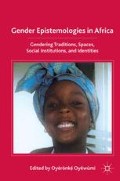Abstract
The epigraph to this paper could easily be mistaken for an adulatory epithet on an altruistic system of channeling needs for the mutual benefit of all: whosoever desires Christianity can pick it up, and Christianity replenishes its store by what the convert gives up. It soon becomes apparent on close examination, however, that the poetry in the proverb conceals an uneven swap; the convert surrenders a defining substance that the belief system remakes into only what can serve its interests. The sentence patterning indicates that the convert “takes,” the belief system “takes,” and neither gives back. Christian monotheism supervises, as it were, a taking contraption that dispossesses the convert of something of value in exchange for a structure of unreciprocated, one-way acceptance. I selected this proverbial saying for the epigraph because it captures the spirit of my argument in this article: discourses of gender practices in Yorùbá life and culture are yet to consider fully how translations of categories from the language of discovery, particularly English, shape the classification and explanations of observed social phenomena. My primary evidence will be the many ways in which known snippets of the life of Ìyálóde Efúnsetán Aníwúrà (ca. 1825–1874), a high-ranking female chief in precolonial Ìbàdàn in Nigeria, are deployed in accounts of the evolution of woman-being in southwestern Nigeria.
A kìí gbà ‘gbàgbọ́ ki ‘gbàgbọ́ má gba nǹkan lọ́wọ́ ẹni (We do not take to Christianity without Christianity taking something of value from us.)
Access this chapter
Tax calculation will be finalised at checkout
Purchases are for personal use only
Preview
Unable to display preview. Download preview PDF.
References
Abraham, R. C. 1958. Dictionary of Modern Yoruba. London: University of London Press.
Adéèkó, Adélékè. 2005. The Slave’s Rebellion: Fiction, History, Orature. Bloomington: Indiana University Press.
Akinyele, I. B. 1951. Iwe Itan Ibadan ati Die Ninu Awon Ilu Agbegbe Re bi Iwo, Oshogbo, ati Ikirun. 3rd ed. Exeter, UK: James Townsend & Sons.
Awe, Bolanle. 1992. Iyalode Efunsetan Aniwura (owner of gold). In Nigerian Women in Historical Perspective, ed. Bolanle Awe, 55–71. Ìbàdàn, Nigeria: Sankore Publishers & Bookcraft Ltd.
—. 1977. The iyalode in the traditional Yoruba political system. In Sexual Stratification: A Cross-cultural View, ed. Alice Schlegel, 144–60. New York: Columbia University Press.
Bowen, T. J. 1857. Central Africa. Adventures and Missionary Labors in Several Countries in the Interior of Africa from 1849 to 1856. Charleston, SC: Southern Baptist Publication Society.
Delano, Oloye Isaac O. 1958. Atúmọ̀ ede Yoruba. London: Oxford University Press.
Denzer, Laray. 1998. The Iyalode in Ibadan Politics and Society, c. 1850–1997. Ìbàdàn, Nigeria: Humanities Research Center.
Hallen, Barry. 2006. African Philosophy: Analytical Approach. Trenton, NJ: Africa World Press.
—.2000. The Good, The Bad, and The Beautiful: Discourse about Values in Yoruba Culture. Bloomington: Indiana University Press.
Hallen, Barry, and J. O. Sodipo. 1986. Knowledge, Belief, and Witchcraft. London: Ethnografika.
Hinderer, Anna. 1873. Seventeen Years in the Yoruba Country: Memorials of Anna Hinderer. 3rd edition. London: Seeley, Jackson, and Halliday.
Ìsòlá, Akínwùmí. 2005. Efúnsetán Aníwúrà: Ìyálóde of Ìbàdàn. VCD. Directed by Kelani Tunde. Golden Link Productions & Communications.
—. 2005. Efúnsetán Aníwúrà: Ìyálóde Ìbàdàn, and Tinúubú Ìyálóde Ègbà. Trans. Pamela J. Olubunmi Smith. Trenton, NJ: Africa World Press.
—. 1992. Two Contemporary African Plays. Trans. Niyi Oladeji. Dubuque, Iowa: Kendall/ Hunt Publishing Co.
—. 1970. Efúnsetán Aníwúrà: Iyálódé Ìbàdàn. Ìbàdàn, Nigeria: University Press PLC.
Jeyifo, Biodun. 1984. The Yoruba Popular Travelling Theatre of Nigeria. Lagos: Nigeria Magazine.
Johnson, Samuel. 1921, 1997. The History of the Yorùbás. Lagos, Nigeria: CMS Bookshops Limited.
Nzegwu, Nkiru Uwechia. 2006. Family Matters: Feminist Concepts in African Philosophy of Culture. Albany: State University of New York Press.
Ogunleye, Foluke. 2004. A male-centric modification of history: Efunsetan Aniwura revisited. History in Africa 31: 303–318.
Oyĕwùmí, Oyèrónké. 1997. The Invention of Women: Making an African Sense of Western Gender Discourses. Minneapolis: University of Minnesota Press.
A Dictionary of the Yoruba Language. 2001. Ìbàdàn, Nigeria: University Press, PLC.
Editor information
Editors and Affiliations
Copyright information
© 2011 Oyèrónkẹ́ Oyĕwùmí
About this chapter
Cite this chapter
Adéẹ̀kọ́, A. (2011). Gender in Translation: Ẹfúnṣetán Aníwúrà. In: Oyĕwùmí, O. (eds) Gender Epistemologies in Africa. Palgrave Macmillan, New York. https://doi.org/10.1057/9780230116276_3
Download citation
DOI: https://doi.org/10.1057/9780230116276_3
Publisher Name: Palgrave Macmillan, New York
Print ISBN: 978-1-349-38475-4
Online ISBN: 978-0-230-11627-6
eBook Packages: Palgrave Social Sciences CollectionSocial Sciences (R0)

